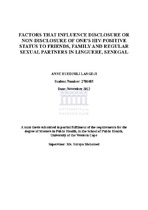Factors that influence disclosure or non-disclosure of one's HIV-positive status to friends, family and regular sexual partners in Linguere, Senegal
Abstract
Background: Disclosure in the context of HIV is the sharing of information about one’s HIV-positive status with someone else. In the case of people living with HIV (PLHIV), many factors influence their decision to disclose. As with other illnesses there is a concern about possible discrimination or stigma. On the other hand, disclosure can lead to higher levels of support and better management of HIV infection. Types of disclosure can also vary depending on the need of the PLHIV, being partial or full, in order to gain the most benefit. Self-disclosure or mediated disclosure with the assistance of someone else is controlled by the PLHIV, whereas involuntary or forced disclosure might not be under the PLHIV's control and thus more likely to have negative consequences. No studies have been done in the rural area of Linguère, Senegal or in the rest of the country to identify the factors that influence the decisions of PLHIV around disclosure. Senegal has a concentrated HIV epidemic with national HIV prevalence stable at 0.7% in 2005 and 2010 Demographic and Health Surveys. Linguère District's HIV prevalence was at 0.8% in 2003. By knowing more about what motivates PLHIV to disclose or not disclose their status, service providers and others can better support PLHIV to practise beneficial disclosure. Aim: The aim of this study was to explore factors that influence the decision to disclose or not disclose one's HIV-positive status to regular sexual partners, friends and family in Linguère District,Senegal. Methods: A qualitative method with in-depth interviews was used to explore the factors that influenced decisions concerning disclosure. Fifteen PLHIV were identified through purposive sampling based on criteria such as marital status, gender and prior disclosure decisions. In addition, four service providers from the AIDS service organization, Projet SSP, and the district health and social workers served as key informants. The interviews were recorded, transcribed and translated from the local languages into French. Record reviews of the HIV/AIDS service organization complemented the interviews. The fieldwork was conducted in the study setting for two weeks in January 2012. The data was analysed through thematic analysis. Findings: The main themes that emerged as reasons for disclosure were maintaining psychosocial well-being, existence of trusting relationships, need for support with health care, reciprocal obligations and concern for others, whereas reasons for non-disclosure included stigma and discrimination and negative impact on family. However, the factors varied from one participant to another and could not consistently be attributed to one group or another, whether man or woman, married or divorced,etc. Influencing factors were related to gaining support for the participant or avoiding problems. Concerns about stigma were great and included reference to wanting others to have soutoura— privacy, dignity, respect. There were also factors which took into consideration the consequence for the person to whom they might disclose, such as desire to avoid upset or desire to seek testing and possible care for a spouse. Of the participants who had disclosed, there were no cases of severe negative consequences. Not one participant expressed regret for having disclosed, rather they acknowledged that there were positive benefits for themselves and sometimes also the other person to whom disclosure was made. The roles of the service providers and the support group were also influential in decision-making around disclosure, with a good number of cases of mediated disclosure. Conclusion: In line with consequence theory, PLHIV weighed up their benefits and costs when decisions around disclosure were contemplated. The benefits were that PLHIV who chose to disclose gained from increased social support and better management of their HIV infection. At the same time further transmission of infection was potentially reduced and others were oriented for testing and for access to care if needed. In general, HIV continues to be a particularly stigmatising condition and thus the majority of PLHIV in this study judged that it is not worth the risk of possible abandonment,rejection or slander to disclose their status, regardless of the fact that few have actually experienced severe negative consequences as a result of actual disclosure. Because of support provided through service providers and the support group, however, those participants who had chosen to disclose to someone outside of the support group were reaping benefits and also likely avoiding the need to turn to risky activities, such as transactional sex or formal sex work. Recommendations: Recommendations drawn from this study include the need to support programmes or initiatives which seek to reduce HIV-related stigma. There is also the need for leaders in the community to show support for PLHIV which can reduce stigma. Health care and service providers should be aware of the needs of PLHIV and the changes that may arise over time which could lead to a decision to practise beneficial disclosure. They should also learn from the experiences shared by other PLHIV which can in turn be shared. They should receive further training in order to better understand the complexity of disclosure and to assist with mediated disclosure.

